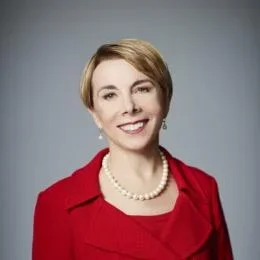Working and living in another country offers many opportunities and challenges. Recently, there has been more to consider than the average move for career or personal reasons. COVID, and the subsequent restrictions and changes to everyday life, present a whole new set of questions, challenges, and even opportunities.
For part two of this series examining the expat experience in a post-COVID era, ACC Chair Jo Anne Schwendinger interviews other in-house lawyers who, like herself, have taken advantage of opportunities to work outside of their home country. Whether you’re interested in becoming an expat or simply curious about experience, read on for their varied insights.

Chief Legal, Compliance Officer, and Secretary at II-VI Incorporated
ACC Chair

General Counsel & SVP Legal at du
Former ACC Chair; Current Board Member

Chief Legal and Corporate Affairs Officer at Budweiser APAC
ACC Member; Top 10 30-Somethings Award Recipient
Where in the world
Jo Anne Schwendinger (Jo Anne): I’ve worked and lived in many places around the world, including France, Singapore, and West Africa. I’d love to hear where you’ve worked, as well as a little about your most memorable experience working in a new country?
Anneliese Reinhold (Anneliese): I’ve worked in Australia, the United Kingdom, Qatar, Oman, and United Arab Emirates. My most memorable experience would have to be the years I spent living in an expat compound in Doha, Qatar — surrounded by a razor wire topped fence, with fortified electronic metal front gates, a military style chicane blocking the driveway, and a guard-post complete with police toting semi-automatic weapons! Yet, somehow, we came to regard all this as completely normal. I distinctly remember happily waving to the guards as I wandered in and out of the gates in my swimming gear on the way to the nearby pool!
Craig Katerberg (Craig): I grew up in Michigan and worked in the United States, then abroad when my wife’s job took her to Argentina and Panama. Then I worked at law firms in Brazil and Peru during law school, and after graduation I worked in New York before moving first to Shanghai, China; then to Australia, and from there to Hong Kong; briefly to Belgium; then back to the United States. I am now back in China.
Jo Anne: That’s quite a list! It might be hard to pick a most memorable experience, but perhaps you could share one of your top three?
Craig: I have two kids; one is six and one is eight. I grew up without a passport and Canada was the first country I visited. Growing up my idea of travel was a minivan full of all my siblings!
My children are having a very different experience: My son’s first words were in Chinese and my daughter’s first words were in Spanish. One day in Shanghai, she came up to me and said, “nǐ hǎo Papi,” which is “hello Dad” in sort of a mix of the two languages. It was one of those moments that I would never have dreamed about growing up. Just the idea of my kids speaking different languages to me and having that be sort of a normal and special moment during the day was very memorable.
"My children are having a very different experience: My son’s first words were in Chinese and my daughter’s first words were in Spanish."
Craig Katerberg
The legal department and securing your seat
Jo Anne: What roles within the legal department did you fill as an expat? Did you manage a global team, and if so, what tools and practices did you use to create connections between team members?
Craig: I’ll mention a couple different roles: I was the head of compliance for Asia when we were building out our compliance function across Asia Pacific, so that involved hiring lawyers in India, Vietnam, Korea, and China. I was general counsel for Australia’s biggest beer company during an integration on a US$100 billion M&A transaction, which covered India and South East Asia. I worked on the finance team as head of M&A during our US$5 billion IPO on the Hong Kong Stock Exchange, and most recently, I’ve been the chief legal and corporate affairs officer for Budweiser APAC, a US$45 billion public company on the Hang Seng Index, which includes the largest public companies on the Hong Kong Stock Exchange.
For me, the best way to connect with people is obviously being there in person, one-one-one, and COVID has made it very difficult to meet with people and ultimately get to know them on a much deeper level.
Two practical things that I have found useful include holding town halls and sending a weekly email to my team. Town halls allow members of the legal team an opportunity to get to know and learn from different members or “experts” on the team. Putting a face to a name, even if it’s a face through Zoom, is very helpful to connecting the dots and humanizing cross-country work.
Secondly, every Sunday night for the last six years I’ve written an email to my team, which is essentially a recognition of all the amazing work different people are doing. I believe this not only makes people feel appreciated, but it also builds awareness among the team and increases the possibility of empathy between people. Everyone is stressed and working hard and can get frustrated when somebody isn’t quickly responding to an email. However, when they read that their colleague was going through an unplanned government inspection or focusing on keeping people safe during a new wave of COVID, perhaps they’ll have a little more patience.
Jo Anne: Having a “seat at the table” is extremely important for in-house counsel. As part of an expat team, how does one remain connected to the department, ensure that their voice is heard on important matters, and that they are never “out of sight, out of mind”? In other words, how do you keep and advance your seat at the table from afar?
Craig: There are multiple tables at any large organization. There’s the table at global headquarters; it’s important to remain connected with the CLO and that team, as well as any other major stakeholders. One tip — congratulate those you know well when they move into a new role. I’ve had many new roles announced over the years, and I’ve learned that some people are good about reaching out and congratulating you — really keeping that personal connection — but most are not. A promotion is sort of like a birthday or a special event; it’s a significant moment in time for that person. So, connecting in a genuine way, perhaps simply reaching out in those moments, helps you to stay connected to those that you value and appreciate in another office.
"There are multiple tables at any large organization."
Craig Katerberg
Frankly, I think this is a good practice with family, friends, and in a professional setting with colleagues you respect and want to stay close with.
Then there’s the table with your CEO and stakeholders in the country or countries where you are working, who are talking to many of your same stakeholders as well. Like them, you are there to help the company achieve its goals and grow. The first principle is to help the business grow and succeed — begin with that mindset and speak how the business speaks. This generates a lot more trust than focusing on the specific concerns you may have from the legal side.
Challenges and opportunities
Jo Anne: Working in a new country presents many firsts, including experiences we may have never had at home. For me, one example was the memorable visit my team and I made to Nelson Mandela’s house in South Africa. Can you share an example of an experience you had as an expat that you likely wouldn’t have otherwise had?
Anneliese: The opportunity to build genuinely culturally diverse teams and lead them to success in very challenging contexts.
"[I've had] the opportunity to build genuinely culturally diverse teams and lead them to success in very challenging contexts."
Anneliese Reinhold
For example, I live and work in Dubai, United Arab Emirates — the most genuinely multicultural city in the world. The fact that 83 percent of the population was born overseas and come from over 200 different countries makes Dubai a fascinating place. I’ve learned so much about the world, others, and myself!
Ironically though, living and working here you almost take Dubai’s incredible multicultural makeup for granted. We assume people in other parts of the world have the same experience and understanding of leading cross-culturally that we do.
For example, I spoke at a conference in Singapore a few years ago and mentioned that my team was comprised of 25 people, 13 different nationalities, all speaking 14+ different languages. To my great surprise, the Singaporeans present were taken aback by that level of diversity! I’d assumed (wrongly, as it turned out) that their experience of cross-cultural diversity would be similar to mine.
Of course, like everything, cross-cultural diversity does have its flip side. As a leader, you must work harder to ensure alignment and success. Nevertheless, despite the undoubted challenges of operating in an environment some have described as “multiculturalism on steroids,” I realize how lucky I’ve been to have had the experiences I’ve had during my expat career.
Jo Anne: Working in countries where cultural norms are very different can present a multitude of challenges, both professionally and personally. For example, attitudes toward women in business vary across the world, as does the position of the general counsel. When it comes to your work as an expat, what is something you’ve found particularly challenging?
Anneliese: When I first moved to Doha, Qatar in the early 2000s, it was still classed as a developing country. There were very few in-house lawyers and very few international/expat lawyers or law firms. Coming from London, where there was an extremely well developed in-house legal community, I was struck by a tremendous sense of professional isolation. (I was also struck by profound culture shock — but that’s another story.)
So, when a few years later I relocated to Dubai, United Arab Emirates and was invited to the first ever meeting of an in-house legal group, I couldn’t get there quickly enough! I distinctly remember walking through the door of the venue (a hotel conference room) and being shocked to discover around 100 other in-house lawyers. We were all living and working in the UAE, yet up to that point none of us had even been aware of each other’s existence!
That group was the start of what eventually became — many years later — the ACC Middle East and North Africa Chapter. In fact, that initial experience of profound professional isolation in Qatar was what drove me to become involved with ACC in the first place. It was very clear to me how much value ACC can add to in-house lawyers in similar situations, and how important it is for all in-house counsel, wherever located, to have access to the resources and professional networks that ACC does such a great job of providing.
"It was very clear to me how much value ACC can add to in-house lawyers in similar situations, and how important it is for all in-house counsel, wherever located, to have access to the resources and professional networks that ACC does such a great job of providing."
Anneliese Reinhold
Craig: Personally, the hardest thing is being far away and not as connected to family. And the longer you’re away, the harder it is and the more you question if this is the life you want. It’s probably very different from the life you envisioned for yourself, and therefore being able to answer that question for yourself and your family is very important.
Professionally, it’s fun but challenging to communicate across cultures, as people have very different ways of communicating. And I don’t just mean countries, I mean cultures.
Communication across cultures and helping people translate between what is intended and what is heard, can be very challenging, especially when you don’t speak the main language or even where you are the only person speaking English as a native language and everyone else is speaking it as a second, third, or fourth language. Trying to make sure that your points and their points are understood can be a big challenge.
Jo Anne: Did you ever feel disconnected from friends and family while working outside of your home country? How did you manage this and what advice can you provide for others?
Craig: A lot of people are not seeing their family very much at all, which means you treasure your time with family even more and find ways to connect. That means a very good data plan, FaceTime, routines, and rituals that you try to create. Those relationships can continue to be strong; it just takes effort. Make sure that you’re reaching out to people to know what’s going on in their lives and staying connected the best way you can. With good friends, even if you don’t talk for months or years, it’s important for you to know that they’re still there, and for them to know you’re still there as well.
Jo Anne: As a leader within the legal department, what is your advice for managers sending members of their team to another country to work?
Craig: For the manager doing the sending, be very clear about why you are sending the person there. It might be to establish a corporate culture, to provide a learning experience, or an opportunity for growth — a training program perhaps. Or it could that there’s a specific technical task that needs to be done. Just be clear as to why you are sending an expat as it’s very expensive, and you want to make sure you are getting value out of the opportunity for the entire organization.
COVID and Post-COVID eras
Jo Anne: Working far from home, learning new cultural norms and business practices, and even the practical side of taking on an expat opportunity like travel requirements have always offered unique challenges. That said, working outside the home, “normal” practices and travel have been dramatically altered over the last year due to a global pandemic. Have you encountered any specific challenges related to working as an expat during this time, when much of the world is still dealing with the impact of COVID-19?
Anneliese: Yes definitely. While coping with the “tyranny of distance” is part and parcel of expat life, in normal times expats take comfort from the fact that, if they need to, at any point they can simply jump on a plane and be back in their home country in less than 24 hours. COVID and its related travel restrictions have significantly moved the goal posts. It’s no longer possible to “simply jump on a plane.” Flights to many countries are severely restricted or even banned, and even if you can get a flight, many countries also impose stringent quarantine requirements on arrival (for example, my home country, Australia, restricts the number of international travelers who can arrive and mandates 14 days quarantine in a government selected hotel or quarantine facility, at your own expense). The COVID-related curtailments of travel have caused significant hardship for expats, and I personally know many for whom COVID has tipped the balance in favor of relinquishing expat life and returning to their home country for good.
Craig: During COVID, people are having very different lived experiences. And that’s true in any country, but we’re just coming off the second wave in India where on our management team, almost everyone has had someone close to them die from COVID. Many people have gone through COVID unscathed or somewhat scathed, and then at the same time you have China, which effectively has been open with very close to no cases for a year plus. Therefore, different leadership is needed across the different areas. Often leadership means being there with people, especially those going through a difficult time, which is hard to do when at best you’re connecting via Zoom. Further, you can’t really know what people are going through personally, but you know everyone is probably going through something.
"Finding that right tone with different audiences is very important, because of course it matters to the people on your team. Making sure that they are receiving the support they need, whether that be with mental health, work 'connectedness' or one-on-one chats, is important."
Craig Katerberg
Finding that right tone with different audiences is very important, because of course it matters to the people on your team. Making sure that they are receiving the support they need, whether that be with mental health, work "connectedness" or one-on-one chats, is important. That’s a big difference with COVID. I think the other challenges are more every day, like travel being affected and not being able to meet in person to build trust and understanding.
Then as I mentioned earlier, the inability for people to be with loved ones is a big consequence of the pandemic. There are many examples of people not seeing their spouse or kids for months or years, and some of that will probably continue.
Parting words of advice
Jo Anne: Do you have any last words of advice for lawyers considering an expat position or opportunity?
Anneliese: Despite the undoubted challenges, if you do get the opportunity, go for it! As the saying goes, the world is your oyster!
Craig: It’s a tremendous opportunity and privilege to have the opportunity to work in a different culture. It’s important to recognize it as the rare and exceptional opportunity that it is.
Make the most of it — use it to bring people closer together and to help increase understanding, which I think the world needs more of right now. It’s not just about you, it’s never just about you, but what you can do is make things better for the people who come after you.




